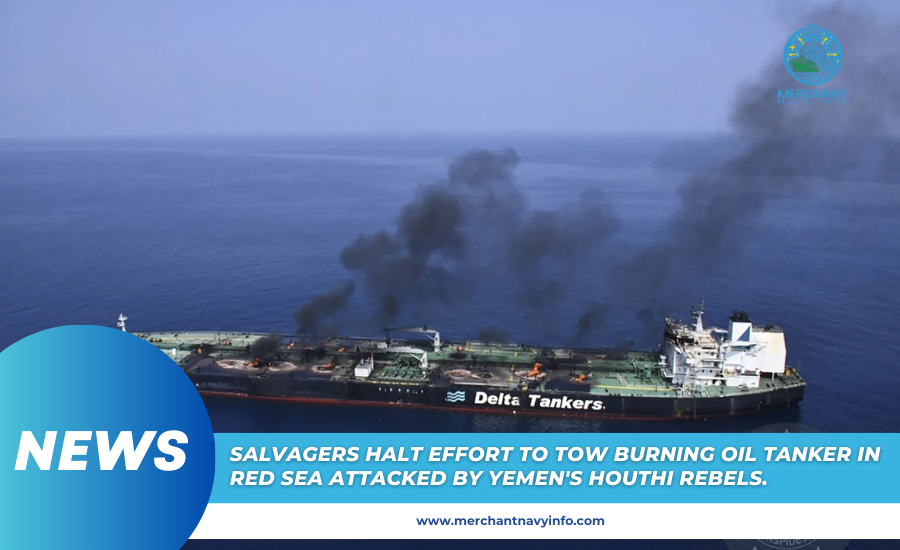
Salvagers halt effort to tow burning oil tanker in Red Sea attacked by Yemen’s Houthi rebels.
Rescue teams abandoned initial efforts to tow a burning oil tanker targeted by Yemen’s Houthi rebels in the Red Sea because “it was not safe to continue,” leaving the Sounion and its millions of barrels of oil stranded, the European Union’s naval delegation said Tuesday, the oil was at risk of leaking.
Although there have been no major leaks so far, the incident has the potential to be one of the worst yet in the Iranian-backed rebel operation, which has disrupted the passage of $1 trillion worth of goods through the Red Sea each year during the war between Iran, Israel and Hamas in the Gaza Strip. It has also halted some aid deliveries to conflict-torn Sudan and Yemen.
The EU’s Operation ASPEZ said, without providing further details, that “the private company in charge of the rescue operation concluded that the conditions for the towing operation were not met and that it was not safe to conduct it. “The private company is exploring alternative solutions.
The EU delegation did not respond to questions from The Associated Press about the announcement. The safety issue could be a fire on board. Satellite images taken by PBC Planet Labs on Tuesday afternoon and analyzed by the Associated Press showed the Sonion was still burning.
The U.S. State Department warned that the Sonion spill could be “four times bigger than the 1989 Exxon Valdez disaster in Alaska.”
Meanwhile, threats of an attack have also been made by the Houthis, who attacked two other tankers passing through the Red Sea on Monday. The Houthis have said they will allow rescue operations, but critics say the rebels are using the threat of an environmental disaster involving another tanker near Yemen to extract concessions from the international community.
The Houthis initially attacked the Greek-flagged tanker Sonion on Aug. 21 using small arms, projectiles and drone boats. A French destroyer, as part of Operation Aspedes, rescued the crew of 25 Filipinos and Russians and four private security guards after they abandoned the ship and were taken to nearby Djibouti.
Rescue teams abandon towing a burning oil tanker targeted by Yemen’s Houthi rebels in the Red Sea.
Last week, the Houthis released a propaganda video showing them placing explosives on the Sounion and setting it alight, something the rebels have done before in their campaign.
Since the Gaza war began in October, the Houthis have attacked more than 80 merchant ships with missiles and drones. They captured one ship and sank two in a campaign that also killed four sailors. Other missiles and drones in the Red Sea have been intercepted or missed targets by the U.S.-led coalition, which also includes Western warships.
The rebels insist they are attacking ships with ties to Israel, the United States or Britain to pressure Israel to end its operations against Hamas in Gaza. However, many of the ships attacked have little to no connection to the conflict, including some bound for Iran.
There are currently no known U.S. ships in the Red Sea because the European Union delegation took over responsibility after the Sounion attack. An unnamed U.S. defence official told the Associated Press that the U.S. military had not been asked to get involved and was not involved in the operation to clean up or evacuate Sounion.
The USS Eisenhower recently completed a month-long deployment in the Red Sea, facing the most intense and sustained fighting the U.S. Navy has done since World War II against the Houthis.
Two U.S. aircraft carriers, the USS Theodore Roosevelt and the USS Abraham Lincoln, and their carrier strike groups are in the Gulf of Oman to counter threats by Iran to retaliate against Israel over the assassination of Hamas leader Ismail Haniyeh in Tehran.
Matthew Pye, a senior analyst at risk consultancy RANE Group, warned that Houthi attacks are likely to continue until a ceasefire is reached in Gaza. Even then, there is a risk that the insurgents will continue their attacks.
“The Houthis have learned a lot from their operations over the past year; it’s been a huge boost for recruiting,” Pai told the AP. “I think they have a lot of motivation to focus on shipping in the future because they know they can be very successful at that, and that’s appealing to the West, which is also the enemy they want to fight to some extent.”









